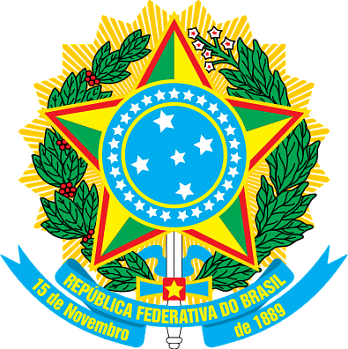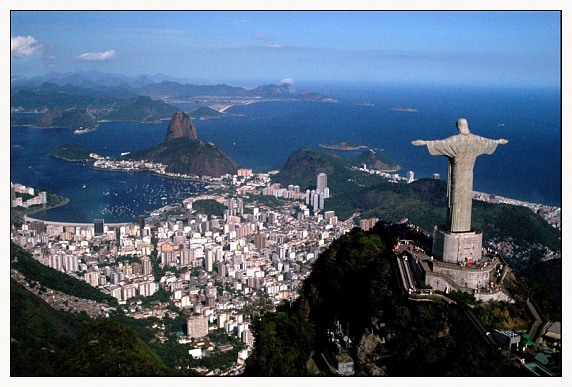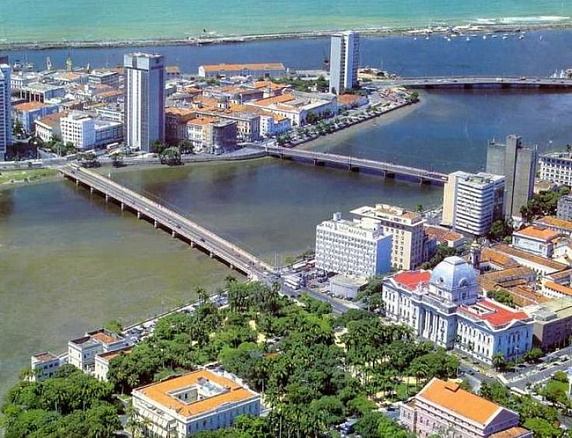 the Federative Republic of Brazil
the Federative Republic of Brazil
Speech of and answers to questions of mass media by Russian Foreign Minister Sergey Lavrov during joint press conference summarizing the results of negotiations with Brazilian Foreign Minister Antonio Patriota, Rio de Janeiro, 11 June 2013
Dear Ladies and Gentlemen,
Dear Antonio,
First of all, I would like to thank you for hospitality here in Rio de Janeiro. Rio is one of unmatched symbols of Brazil; you always feel the rhythm of your great country and your great people here.
We have a long-lasting friendship, and this friendship governs all our initiatives and plans approved at the level of presidents and embracing all the spheres of human communication, communication of countries, business, civil communities' one can think of. Our agenda is very substantial. It is based on trade, economic and investment interaction. Brazil is the largest partner of Russia in Latin America. Presidents of our countries set a task to bring the bilateral turnover of goods to 10 billion US dollars per year. This task is accomplishable, taking into account coordinated plans and those of them that are at the stage of reconciliation, in large projects in the field of nuclear energy and in other lines of the energy dialog. We have good leads in the field of space, in other high tech sectors. I am convinced that we will implement all the set tasks.
We will certainly not limit ourselves to the above mentioned fields. Antonio has already mentioned agricultural products and other types of products. We are interested that the turnover of goods grows in all its segments.
Beside the economy, we are united by our aspiration to the development of contacts between people. Next year we plan to hold Days of Brazilian Culture in Russia and Days of Russian Culture in Brazil. Humanitarian, scientific, educational exchanges are developing more and more intensively for the benefit of our countries and people.
We closely coordinate our actions at the international arena in key issues of global policy and economy, cooperate and coordinate steps within the UN, as well as in formats of the Group of Twenty and BRICS. Today we also talked about it, including with a view to prepare to the summit of the Group of Twenty this September in St Petersburg and the summit of the Group of Twenty in Brazil in 2014. We both are interested in the use of these collective formats to advance reforms in international trade, foreign exchange and monetary field, to let new centres of economic growth take a more fair place in the international system.
The same refers to the global policy. Russia and Brazil advocate for strict enforcement of the supremacy of law, respect of the UN Charter, decisions of its Security Council, to achieve enforcement of its decisions in good faith, without any expanding and unacceptable interpretations.
In the humanitarian sphere, I will highlight a topic that actually is of particular interest. Sufficiently long time ago Brazilian colleagues open a football school in Krasnodar, where they transfer their invaluable and unique experience to Russian football players. We were surprised to learn and we discussed it today that not so long ago ice hockey started to take roots in Brazil, in particular in São Paulo. I hope, that when we return to Moscow, we will try to come back to the initiative of football school in Krasnodar and will try to organise that Russian professionals help organise ice hockey in Brazil.
Mr Patriota has already told about forthcoming large events. We will accept the Olympic Games in our countries. Russia will also hold World Football Championship. Cooperation in the sphere of support of sports ideals at the international arena is very important in our relations.
Touching upon specific international affairs, we talked about Syria a lot today. Our positions are close. We wish Syrian crisis to be resolved in a political way based on agreements among all the Syrians within the framework of an inclusive dialog and with support of the international community. We wish this country to preserve its territorial integrity, remain sovereign, a house for numerous ethnic and religious groups that have been living there for centuries, and the peace process contribute to the pacification of the situation in the entire region.
We share a position with Brazil in favour of the need to urgently overcome the deadlock in Arab-Israeli conflict settlement, primarily in what concerns the Palestinian problem. In general, we have very close approaches with Brazil to the conflicts, which, unfortunately, continue to grow in the region of the Middle East and North Africa and on the African continent in general. We are interested that this huge and very positive potential of cooperation in bilateral and multilateral issues is constantly transferred into practical affairs. We feel the same disposition from our Brazilian friends. To that end, our today's negotiations were very valuable to put into effect the agreements that have been reached at summit level.
We are certainly expecting the President Dilma Rousseff in St Petersburg at the summit of the Group of Twenty, where, I am sure, the President of Russia Vladimir Putin will discuss the state of bilateral relations with her. I hope that our today's meeting will help decently prepare to this contact of our leaders.
Question: Has Russia received an official request of US citizen Edward Snowden for political asylum? If not, will this issue be considered? How does Russia assess the act of this American?
Sergey Lavrov: I have not heard about any official request from Mr Snowden. The second part of your question is not up to date – no request, no guesses. If we receive such request, we will consider it.
Question: Does the UN Security Council currently discuss the initiative of Russia about sending their peacemakers to Golan Heights? What is the attitude of your partners in the Security Council to it? Have Israel or Syria expressed their attitude to this intent?
Sergey Lavrov: Pursuant to applicable UN rules, the Security Council does not take any official decisions about national contingencies included into a peace-making operation. This is the prerogative of the UN Secretary-General, who consults directly with the parties involved in the conflict, and when they agree to the contingency of any country, informs UNSC about it, and the Council, in its turn, takes this information into account. Having regarded to these rules, in this situation, all depends on Israeli and Syrians.
When the current operation for the deployment of UN disengagement forces in the Golan Heights was organized in 1974, the Israeli and Syrians concluded a protocol (without any UNSC resolutions), where they agreed not to use contingencies of the states which are permanent members of the Security Council. As you understand, it was "cold war" that time and only one year has passed after a "hot" war in the Middle East. Therefore, nobody wished to create a situation in which permanent members of the UN were in some way involved in the peace process. Mutual suspicions and mistrust were observed.
The situation is contrary now. I have not heard any unambiguously negative comments in respect of the proposition of the President of the Russian Federation as regards the Secretary-General considering the possibility of inclusion of our contingency in the UN disengagement forces, if Israel and Syria agree. Doubts are expressed about the idea itself with reference to the Protocol of 1974. However, this document may be easily replaced by a new agreement between Israel and Syria. They also say that Russia is trying to build up its influence in the region. I wish to say that our initiative is dictated not by this consideration, but exclusively by our aspiration to enforce security in this very fragile section of the Middle East.
Golan Heights is a part of territory of this region, which has been the safest in the last decades. There have never been any serious aggravations. We advocate for observation of all UN decisions and for settlement of all the remaining territorial disputes using peaceful, political and negotiation methods. We have always noted that Golan Heights have the most peaceful situation as compared with the other territories bordering with Israel (Israeli colleagues confirmed it).
At the height of the Syrian crisis militants combating against the regime of Bashar al-Assad, started to occupy territories in the Golan Heights to use them for provocations. We certainly do not want this situation to blow up. If the goal of militants is to provoke the involvement of new players into military actions, everybody should strongly reject it. The purpose of our proposition is to prevent the conflict from expanding and to prevent transformation of a sufficiently stable territory of Golan Heights into a new site of a bloody conflict.
I can assure you again that, if Israel and Syria agree, and the UN Secretary-General takes a relevant decision, our peacemakers will securely fulfil their task of stabilisation of the situation in this region with honour and decency.
Question (addressed to Antonio Patriota): Was Brazil invited to participate in the international conference on Syria? In what form may Brazil assist in this issue?
Sergey Lavrov (adds to the answer of Antonio Patriota): A very uneasy situation is being established now around the initiative to convene the conference. There is a range of problems on this path. The main problem is the composition of participants. I should say that we will welcome the participation of Brazil, but, first of all, we need to agree on participation of those who are directly involved into the conflict and affect the opposing parties.
The first part of this "enigma" is associated with Syrian parties. As you know, the Geneva Communiqué of 30 June 2012 and the Russian-American initiative of 7 May of this year envisage starting the negotiations between the delegation of the Syrian Government and representative of opposition groups – in plural. It is not mere chance that plural was used. Authors of the Geneva Communiqué of 2012 and of the Russian-American initiative of 7 May understood well that the opposition should be represented in full, not only by the National Coalition for Syrian Revolutionary and Opposition Forces consisting mainly of emigrants who have not lived in Syria for many years. Of course, there are many people among them who take care of their people, the destiny of their country, and they should be involved in this process. But they should not be the only representative of those who oppose the regime, wish to find a general Syrian consensus.
Currently we see the wish of internal Syrian opposition forces, in particular the National Coordination Committee, the Supreme Council of Kurds of Syria to represent interests of the citizens of the country supporting them at the international conference. Nobody is against the participation of the National Coalition. However, first of all, we cannot request all the opposition members agree to go "under the umbrella" of the coalition, even more so that we see no "umbrella" yet, which means that the coalition has no constructive programme for the future of Syria, which it could present. Secondly, because the Coalition was not able agreed on the head of its own structure.
We maintain communication with the majority of heads of the National Coalition, we appeal to them to try to unite not on a negative basis of overthrowing the regime, but rather they should try to offer a platform that could be viewed as their vision of the future of Syria. Currently, there are no agreements on a leader, or any platform from the coalition. We hope a lot that those who may influence it (USA, European countries, LAS member states, especially states of the Persian Gulf) will be able to influence the coalition in the tideway of the agreements reached in Geneva in 2012 and in Moscow on 7 May of this year.
The second problem concerns the circle of external players. I have already said that we will be glad to see Brazil among them, taking into account its always objective and balanced position on any international problem, its aspiration to promote finding of compromises. I will highlight it again, that to that end the participation of Brazil would only add objectivity.
However, the main issue not related to the composition of external players has not been solved yet. Russia insists on the need to invite all neighbours of Syria and states of the region who directly influence the situation. This certainly refers to Iran and Egypt, because everybody sees the leader of the Arab world in ARE. We think that without Egypt the representation of Arab countries at the future conference will be counterproductive.
Unfortunately, our partners are against such full-scale representation of countries of the region at the conference. They especially oppose to the invitation of Iran. We hear, to put it mildly, unconvincing arguments that Iran, as if does not contribute to a constructive approach to the events in Syria, "reading" that Iran does not aspire to replace the regime in SAR.
Therefore, beside organisational difficulties, there are content problems as well, primarily in what concerns our joint goals. If the joint goal is to convene a conference for peaceful settlement of the crisis based on the agreement of the Geneva meeting of 30 June 2012, then we should fulfil the conditions regarding the need to create a transitional governing body based on agreement between the government and the opposition in good faith. This is the key provision laying in the basis of all current efforts. The need to implement the Geneva agreements in full scope was fixed in our joint initiative with John Kerry.
Therefore, it is weird for us to hear that some American representative, having not understood the nature of the initiative, states that the only task of the conference is for the delegation of the Government of Syria to come to Geneva with authority to hand over all their powers to the opposition. This is an absolute substitution of notions. We are very worried about it, because it aims to disrupt the very idea of the conference, which we formulated together with US Secretary of State during his visit to Moscow on 7 May.
The second thing we are concerned about are approaches of the opposition at which our partners, including the USA, European countries and states of the Persian Gulf, and some other Arab participants in general, stake. The statement of the National Coalition for Syrian Revolutionary and Opposition Forces and the Free Syrian Army affiliated to it consists in the idea that they can go to a conference only, when "military balance is restored on the earth". If we consider this criterion, then we will never convene such conference. Currently, the opposition considers that its military achievements reduce, and requests that others "pump it up" with weapons to restore the balance. If they manage to press military forces of the government, the latter will also start talking about their wish to restore the balance of forces, and then we face an endless vice circle and nobody will ever break it.
In my opinion, to encourage such moods of opposition members in favour of arming them to let them regain some additional territories in Syria means to acts contrary to the idea of convening a conference.
We have to consider the discussions staring in Western capital cities on preparations to introduction of a no-fly zone and humanitarian corridors in Syria even if there are no necessary decisions from UNSC in a negative tideway.
All of us need to understand: either we work for peaceful settlement, or the conference was only conceived to prove its usefulness and thus justify other forms of solution of this conflict, primarily, armed intervention from outside. We will continue our conversation with our American colleagues on this topic.
As Mr Patriota has mentioned, the meeting of co-founders of the conference took place in Geneva on June 5. Their next meeting with UN representative and Lajdar Brahimi is planned for June 25. We will try to attain ultimate clarity in all these issues. We should not appeal for convening the conference and make actions I have just mentioned and which disrupt the very idea of such forum.








